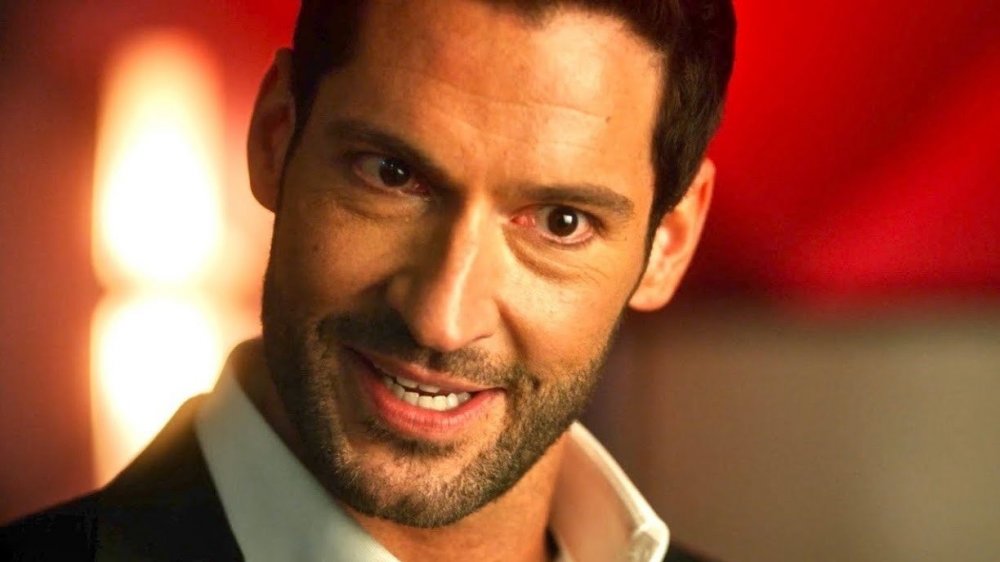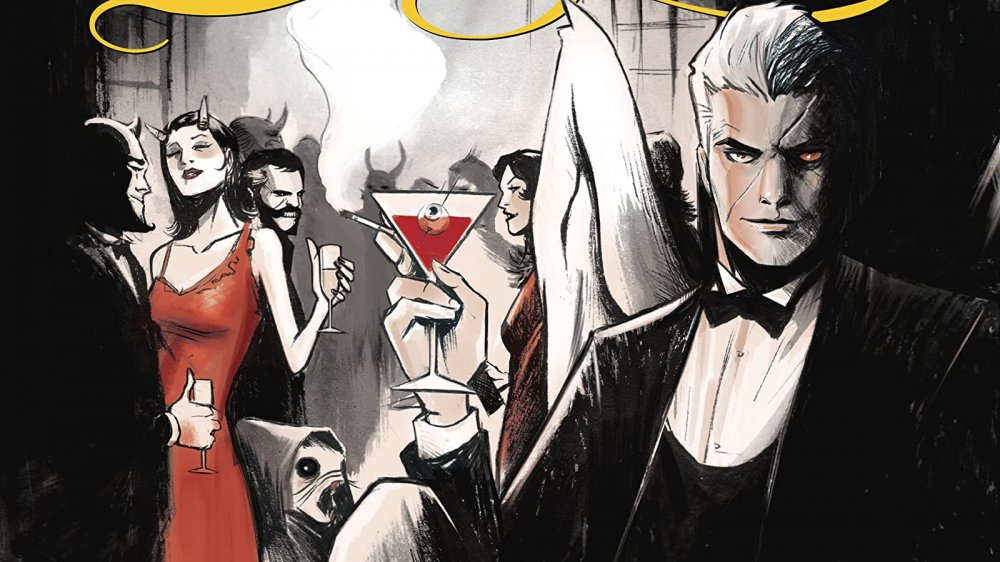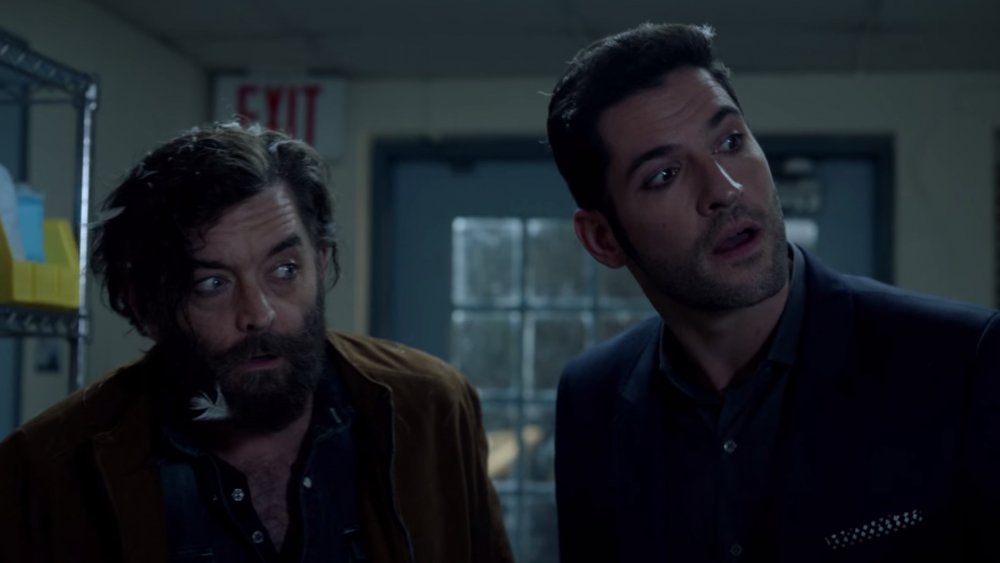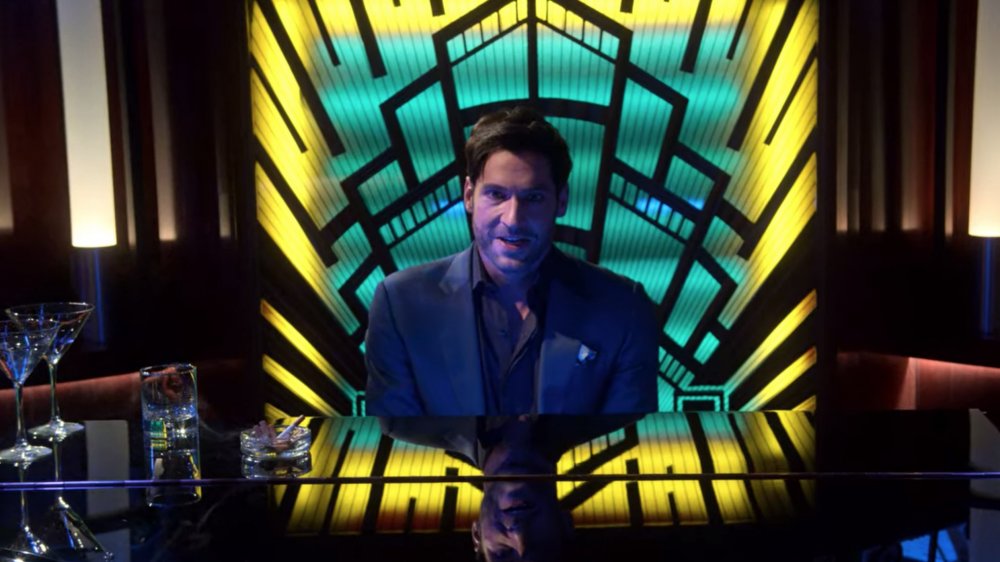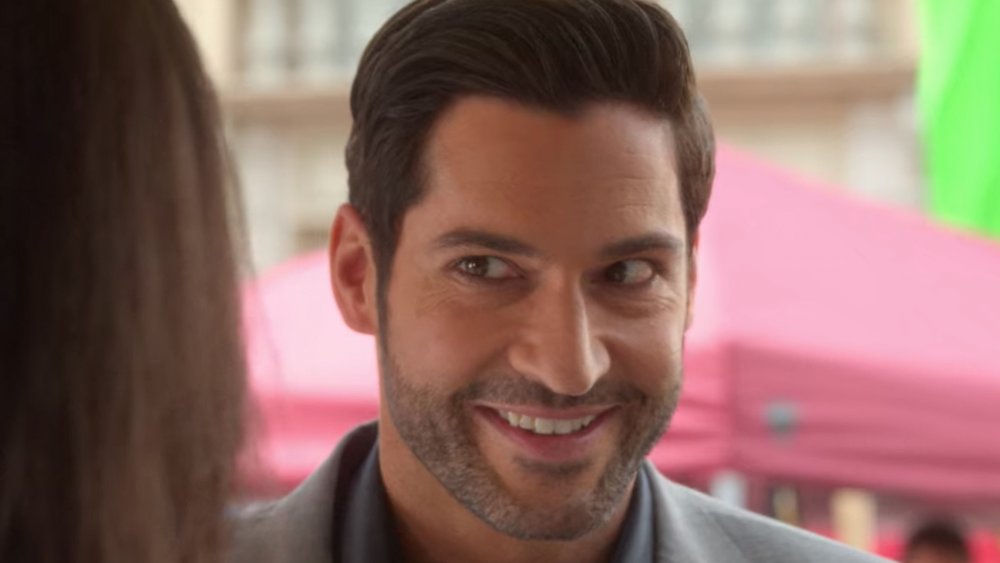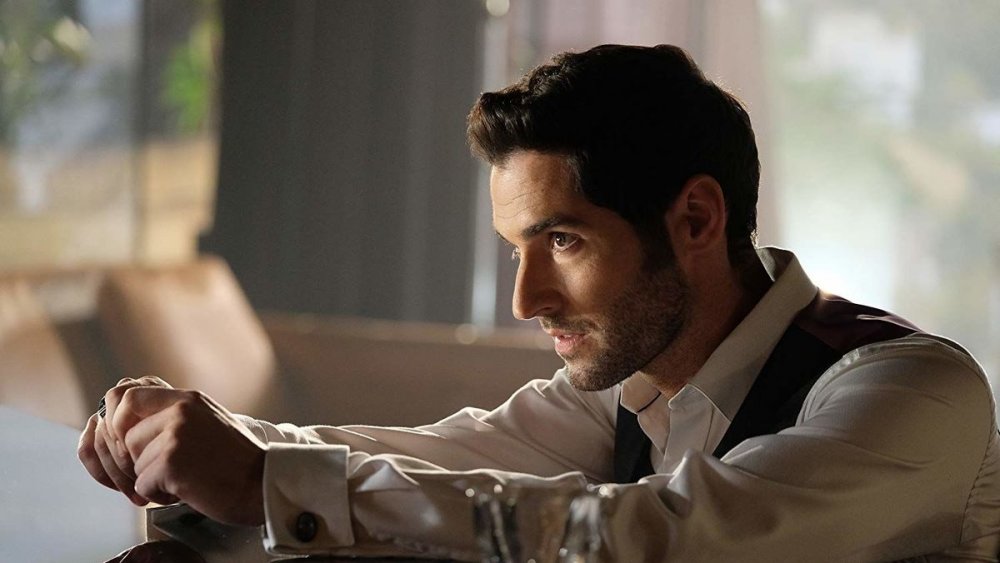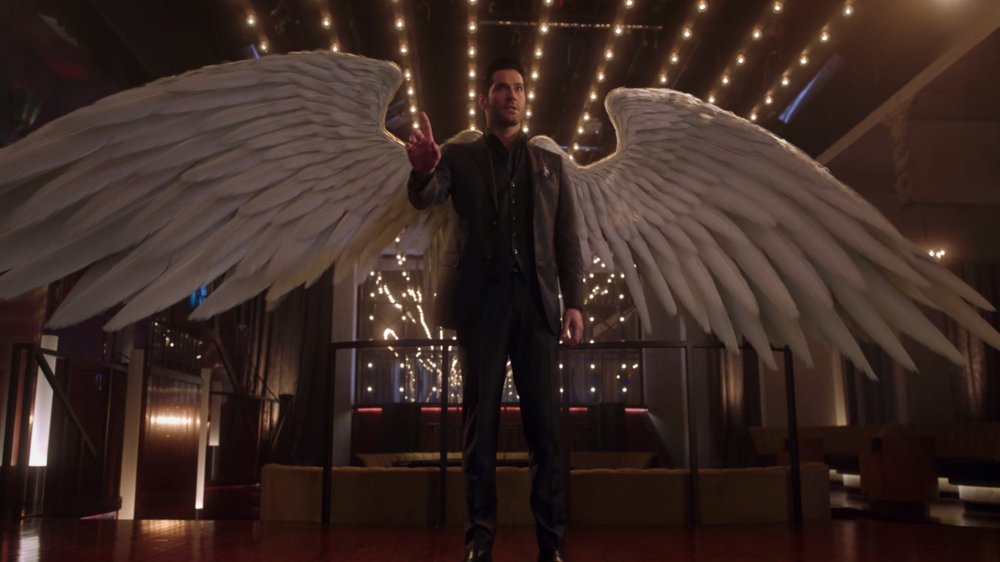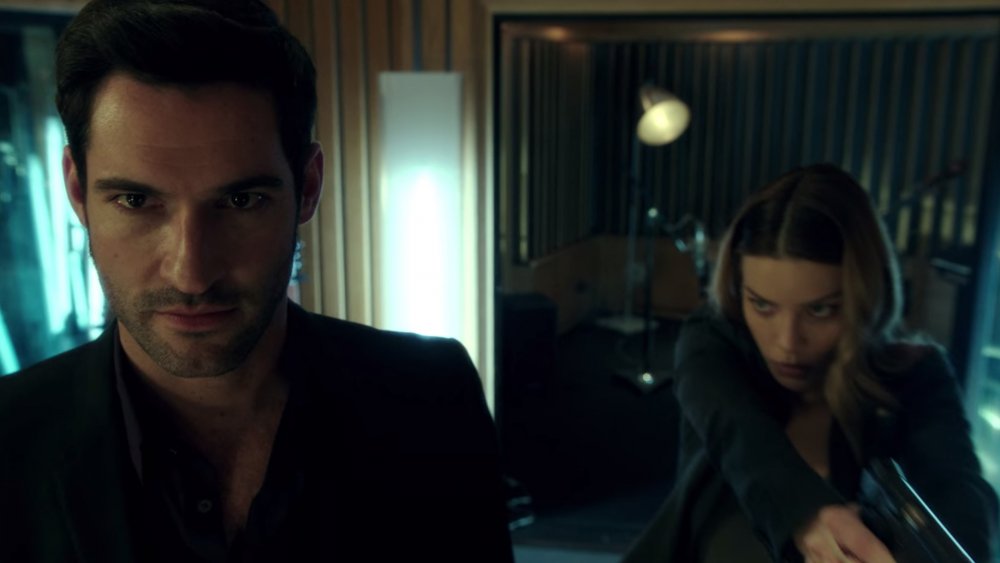What Nobody Told You About Lucifer
A good network TV schtick is an elusive beast. You never know where success is going to strike. For example, no one would've guessed that Lucifer — a show about the Devil getting bored, opening a nightclub in L.A., and helping cops solve murders — would gain the fanbase it's developed. However, its diabolically delightful plot is wrapped in amusingly low-budget effects and admirable acting. And most of the show's success is undeniably thanks to the amazing presence of Tom Ellis, an actor who plays the show's titular character, Lucifer Morningstar, with delicious ease. He's taken a seemingly one-dimensional character and dragged us down into the Devil's world as the fallen angel struggles to understand what these pesky things called "emotions" are.
Sadly, Fox rang the show's death knell after season three, but lucky for us, Netflix saw its potential. The streaming platform picked up all three seasons and then started production on a fourth. The change in platform allowed for the show to go down darker pathways and really explore a number of interesting possibilities, putting more focus on intriguing character development rather than cheesy, gimmicky guilty pleasures. But regardless of the season, Lucifer is a truly intriguing show that's caused us to do some sleuthing of our own, and we dug around for fun tidbits that could satiate our hunger for the dark prince. From his hellish origins to the truth about the show, here's what nobody told you about Lucifer.
Lucifer is based on a comic book
A large portion of Lucifer is lighthearted entertainment, which is why you might be surprised to learn that the show is actually based on a comic book character from 1989. The original source material was created by Neil Gaiman and released by DC comics, with Lucifer appear in Gaiman's influential Sandman series before graduating to solo comics in 1999. As you might expect, the comic books are considerably darker and more philosophical than the series. It's likely that network writers went down a different road in order to make the character more relatable and also to fit into budget restraints. A truly accurate adaptation of the comics would've called for a budget that Fox would've never coughed up.
In the comics, Lucifer's adventures take him to other dimensions where he interacts with different beings that are anything but human. Morningstar's personality is also much different in the comics, as he's more arrogant and selfish. He couldn't care less about the emotional repercussions of human beings. In the show, however, Lucifer may display selfish qualities, but he makes it apparent that he's putting effort into being better. He's on a journey of self-discovery, and he grapples with the concept of emotions and struggles to accept love.
Also, when creating the character for The Sandman, Gaiman based Lucifer's look on the legendary David Bowie. Much respect to the source material, but we're thankful casting took a risk on Ellis. Granted, a reincarnated Bowie marching around L.A. and trash-talking its citizens sounds fun, but Ellis has left his own unique mark on the beast.
Lucifer's accent wasn't originally British
When Tom Ellis was hashing out the nuances of Lucifer Morningstar, he originally made the obvious choice for an L.A. citizen and gave him an American accent. After all, the Devil has existed for millennia, and undoubtedly, his style of blending in would be analytical. A "when in Rome" approach to his dialect sounds like the obvious choice to make. But after trial and error with the written dialogue, Ellis felt that his character was coming off as more of a jerk than he wanted. The intent, after all, was to have Lucifer be sarcastic but charming. So, he decided to go with a British accent because, as Ellis explained via Twitter, "With a British accent, you can say pretty much anything and get away with it."
Ellis certainly made the right choice. It's hard to imagine the charming devil with anything but a suave dialect that screams "tell me your secrets." We can't see Lucifer radiating the same vibe with an American drawl. Imagine a good ol' California boy staring deep into someone's eyes and saying, "Hey, what do you desire, buddy?" That wouldn't be the personality fans would gravitate towards. After all, when you're dealing with an American audience, there's something perfect, dangerous, and sexy about the British accent, even if it's a little weird when it's showing up in the L.A. nightclub scene.
There was a petition made to cancel the show
During Lucifer's advertising campaign leading up to its initial 2016 airing, there was quite a bit of backlash. The religious community condemned the show for its depiction of their most notorious biblical villain, and Christians stated that the show mischaracterized the Devil and mocked their beliefs. There was even a petition started up to cancel the show by the group One Million Moms, and according to The Daily Express, they amassed over 38,000 signatures before the show aired. Of course, the network charged ahead anyway.
Even after its move to Netflix, the show has continued to upset the devout. For example, there was yet another petition started up to cancel Lucifer again, this time with over 100,000 signatures. The main beef the religious community seems to have with the show is the depiction of Lucifer as a good guy. They view it as an affront — a statement that Hollywood is denying the existence of God while giving his evil counterpart a TV show. But hey, there's no such thing as bad publicity, right?
Lucifer's first season garnered around seven million viewers, which was enough to send the series into season two. The show's success and story arc almost appear to be an act of defiance against the pushback, with demons and angels both learning about what it means to be human. In Lucifer, celestial entities go against their very nature to nurture the emotion known as love, and showing that even the Devil can change is sending a big message.
Keep your ears open
Lucifer is known for casually slipping word play and sexual innuendo into its dialogue, and it's pretty entertaining to see the ways that writers sneak jokes past the network censors. Lucifer is the devil after all, so he can't be entirely PG. A perfect example would be from season two, episode two when Lucifer arrives at his penthouse with a woman and, while standing at the foot of his bed, his angel wings pop out. He sighs and says, "I don't usually suffer from premature unfurling."
The British swagger of Lucifer combines well with the cheeky jokes we get from time to time, such as when he refers to the moment his celestial parents met as "the Big Bang." But the dry humor can distract from another nuance as well, one that likely would've gone unnoticed without the show's switch to a streaming platform. In each episode, Lucifer actually says the name of the episode out loud. It's always fun when creators give us a subtle reason to dive deeper into the world they've created, and the knowledge of this little joke can give each episode viewing an extra little thrill. After all, it's fun to keep your ears open after seeing the episode is titled "Orgy Pants to Work." In this case, it pays off when Lucifer shows up with his backside hanging out of his pants and exclaims, "Oh my! I've worn my orgy pants to work, haven't I?"
Lux is more than it seems
The common thread between the comic and the show is Lucifer's nightclub. Even when the writers were making all the changes for the TV adaptation, it was obvious that his base of operations was a must. After all, Lucifer takes a lot of pride in his club. (However, we are left wondering how pricey those drinks are, given the cars that the ruler of Hell cruises around L.A. in.) And it turns out that Lucifer dove into his own lore when settling on a name for his infamous nightclub.
Lucifer's lair is known to the denizens of L.A. as Lux. Every night of the week, the place is packed with sparkling dresses and sharply dressed rainmakers. But it's unlikely that any of them are aware that their favorite dimly lit haunt is derived from the Latin word for "light." This is an especially clever choice given that the etymology for the name "Lucifer" is "light-bringer." Of course, the dark tiles and soft lighting make it clear that the Prince of Darkness was being a bit less literal with the name, but still, he's clearly chasing a feeling.
Nothing is said in vain in Lucifer
Lucifer pulls a lot of its story structure from religious mythology. We get angels, demons, and ancient beings. The show makes clever use of these well-known stories, absorbing them and filtering them through the show's format. However, given its close ties with the Bible, it's surprising that across all its seasons, there hasn't been a single, real mention of its most recognized character.
Lucifer, his angelic brother Amenadiel, and all the other characters never once reference the most famous biblical character — Jesus. This is a surprising fact with all of Lucifer's twists and turns that call for curse words and shocked exclamations. But even in the case of characters being startled, nada, none of the main characters ever use the name of the Son of God in vain. And that seems pretty intentional. Maybe the show's writers felt that mentioning his name would call for too much explaining as to how Lucifer relates to Jesus. Or given all of his layers, maybe Lucifer despises him so much that he's completely pushed the name out of his mind altogether. Only time will tell. We won't hold our breath, though. The Savior is known for keeping us waiting, after all.
Nothing to sync here
The softer side of Lucifer's personality is put on display through his soothing piano songs, as the Father of Lies steps up to the keys and mellows out the energy in his nightclub from time to time. His songs are gentle, they set a tone for the episode, and the piano ballads tend to foreshadow an emotional journey that's about to take place. But surprisingly, Ellis isn't just a killer lip-syncher in those episodes.
The voice you're hearing in those songs is actually Tom Ellis himself, and as the actor explained to Vulture, it was a complete accident that he got to show off his pipes on the show. "The cast and crew were having a karaoke night out in Vancouver," Ellis explained, "and I got up to belt out a song. The producers didn't know I could sing, so they decided to work it into an episode in the first season."
However, the dapper hunk didn't play the piano. Ellis revealed to Hidden Remote that in past years, he was only responsible for the singing in those scenes and that he "never learned to play the piano." As the show is moving forward, though, the actor appears to have expanded his repertoire, as social media posts have shown him working out on the keys and flexing his pipes. And it probably comes natural to the man, as Ellis hails from a talented family with a big musical background. His mother was a music teacher, and the actor grew up playing the trumpet and the French horn. Looks like he's working towards adding piano mastery to that list.
Netflix tips their hat to the devil
While season one of Lucifer started off with decent ratings that called for Fox to order more seasons of the show, things began to drop off slightly as the series progressed. The first chunk of episodes averaged over 7 million viewers. By the end of season three, the average viewership had dropped to just over 3 million. Fox saw this as a good enough reason to exorcise the show from their Monday night lineup.
The crew of Lucifer didn't have to suffer for too long, though. Just a month after the announcement, Netflix made one of their own. They picked up the rights to the three seasons of Lucifer, and the streaming service also announced that they'd be producing a fourth season. The minds working at Netflix know what they're doing. Not only did they see the show's potential, but they also helped add to the show's nuance, as the announcement of season four was made exactly 666 hours before the show was available to stream at midnight on May 8, 2019. How devilishly clever.
Lucifer continued to pick up momentum, and the show's fanbase has grown vastly since its departure from Fox. Maybe the dip in viewers was less about the show itself and more about the platform. Then again, Fox has definitely become known for cancelling shows too soon. (See Firefly and Family Guy for proof on that one.)
The role Tom Ellis was born for
Season five of Lucifer is looming just ahead, set for release in August 2020, and the trailer teased an interesting development. (Spoilers ahead.) We left our favorite demon overlord in a heartbreaking situation last we saw him. Lucifer ended season four with his departure from the earthly realm, returning to his seat of power in Hell. However, we can't have a show based in L.A. called Lucifer without Lucifer, right? Show writers agreed.
Lucifer's season five trailer shows the debonair anti-hero back in his earthly element ... but not quite the same. Something seems off about the Lucifer we know and love. Turns out, it isn't Lucifer. Someone is impersonating him, and once the real deal arrives, we're all seeing double. While two versions of Tom Ellis sounds delightful, it's unfortunately just fiction. Kind of. In real life, Ellis actually has a twin sister! However, he doesn't seem to share many details about her, other than the fact that she exists. Given his current stardom, the choice to respect her privacy is a smart move. Interestingly, he has a total of three sisters, with Ellis seeming to be closest with his sister Naomi, describing her as his "biggest fan." Ironically, a large portion of his family are also members of the clergy. In an interview with Fair Game, Ellis revealed that his father, one of his sisters, and his uncle are all pastors. Despite his popular role as evil incarnate, they apparently all support his career.
The dark becomes the light
Originally, Netflix announced that season five of Lucifer would be the final season, but it seems the show just isn't ready to throw in the towel. Lucifer continues to find more life, with Netflix announcing a sixth season back in June 2020. We're excited to see where creators take him on his devilish journey. Already, the show has guided us down darker pathways, and new episodes are panning out to be no different. Plus, the writers continue to display their knack for creative brilliance even in teasers for the new season. And paying attention to little details can give you hints as to what will take place later on.
Turns out that Lucifer has another brother by the name of Michael. The reason Lucifer seems to be acting so different in season five is that his brother is impersonating him. There's a moment in the trailer where we see Michael's wings in all their charcoal glory. Creators continue with their knack for subtlety with this touch. Lucifer is known as "the Light-Bringer" and has majestic, white wings. With Michael's dark wings, it's clear that they're trying to tell us something. The show is poised to be an epic battle of light versus dark, with the Prince of Darkness reclaiming his ancient role as the bringer of light pitted against his rival brother playing the ... Dark-Bringer?
Lucifer originally wasn't about solving crimes
Lucifer wasn't always meant to be a consultant for the LAPD. The mischievous hellion initially had different intentions for the City of Angels. Tom Ellis revealed in an interview on The Rich Eisen Show that the series was originally going to be about the Devil living in L.A. and interacting with seedy characters. Here, Lucifer would create scenarios where he could offer deals that he would cash in for favors later on. While the show currently hints at aspects of this, it's merely a remnant of the show's original intentions.
In fact, the whole concept of Lucifer solving crimes was a "happy accident," as Ellis described it. His character served as an LAPD consultant in the pilot, and the episode tested incredibly well. Naturally, the writers saw more potential for various storylines, and thus, Lucifer began cracking cases. However, it's interesting to think about the version of the show with Lucifer acting more like, well, Lucifer. We would've lost the hint of nobility we get from his pursuit of justice. He would've been more devilish but less relatable, and we also wouldn't have the repetition of the distinctive, nasally tone that Lucifer switches to when slyly addressing Chloe as "detective." In other words, alternate-reality Lucifer sounds more manipulative and crass, rather than the one we all love now, who we just want to hug and tell him everything is going to be okay.
